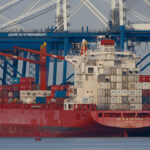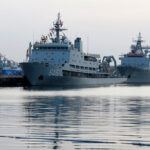London’s new ambitions in the South Atlantic are unlikely to meet with much resistance from the Millay government.
of Malvinasor the Falkland Islands, conflict rekindled In the heading Although it doesn’t make the front pages, Argentina is drilling for oil. This time, it’s minerals. For over a decade, the British government, working with British company Rockhopper, has been exploring the archipelago’s waters for oil. Now, it appears they’ve found a black gold mine, reportedly with reserves of around 500 million barrels. Now comes the difficult task of extracting the oil from the archipelago’s hotly contested waters.
Legal consultations will be held on the islands over the next few weeks, at the end of which local residents, known as “Kelpers,” will vote on whether to allow the drilling of about 23 wells in an area known as the Sea Lion field, about 220 kilometers north of the islands. If approved, Israeli energy company Navitas Oil could start drilling later this year. Navitas expects to extract more than 300 million barrels over the next 30 years, with most of the profits going to Israeli and U.S. shareholders.
The Sound of Essequibo
Royalties from drilling could transform the archipelago’s fishing and tourism-dependent economy, in the same way that recent oil drilling in disputed waters off the coast of Guyana has enriched the country’s economy, albeit at a costly rate. report Drilling by ExxonMobil in Guyanese waters late last year reignited a centuries-old border dispute between the former British colony and neighboring Venezuela, prompting Maduro’s government to hold a referendum on annexing the disputed territory of Essequibo.
Guyana was once a Dutch and then British colony, and Essequibo occupies a vast 160,000 square kilometres of Guyanese territory that has been claimed by Venezuela for the past 200 years. Guyana was once a British colony, and the Falkland Islands remain British territory. The oil discoveries also vary greatly in size. The United States Geological Survey estimates that there are approximately 13.6 billion barrels of oil and 32 trillion cubic feet of gas reserves waiting to be drilled off Guyana’s coastline, more than 26 times the amount of oil discovered so far off the Falkland Islands.
In Argentina, Gustavo Purti, a member of the United Fatherland party, has introduced a bill in the state parliament calling on the government of President Javier Milley to address the situation. Like many opposition politicians, Purti said: Blame He accuses the Millay government of “doing nothing” to defend Argentina’s sovereignty in the face of constant infringements from London.
In just five months, the UK has unilaterally expansion It will abolish no-take zones (areas where fishing is prohibited for environmental reasons) around the South Georgia and South Sandwich Islands (SGSSI) near the Falkland Islands. This will result in an additional 166,000 km2 to the 283,000 km2 already prohibited since UK authorities established the marine protected area (MPA) in 2012. London will also Confirmed Britain is planning to build a new port in the Falkland Islands that could serve as an outpost for British interests in Antarctica, and now, to top it off, it is about to begin drilling for oil in the Argentine Basin.
Located 250 miles off the southern tip of Argentina and 8,000 miles from the British coast, the Falkland Islands/Malvinas Back Home The Falkland Islands, home to 3,500 mostly British people, have been the subject of a territorial dispute between Britain and Argentina ever since a British expedition invaded the islands, evicted the inhabitants, and planted the British flag in 1833. After the Suez Crisis of 1956, the British government began to give up most of its colonial holdings in Africa, Asia, and the Caribbean (while building a vast network of tax havens in return, of course), but London decided to hold on to the Falkland Islands for obvious geopolitical interests.
Now a British overseas territory, the islands are technically self-governing, with defense and foreign affairs handled by the British government. London frequently cites the fact that nearly 100 percent of the islands’ residents approved remaining under British rule in a 2013 referendum. Argentina claims the islands’ inhabitants were essentially displaced by British colonialists.
In 2022, the United Nations Special Committee on Decolonization Adopted The resolution called on both governments to “consolidate the current dialogue process through the resumption of negotiations to find a peaceful resolution to the territorial dispute.” Most delegations supported the call to resume dialogue. The Pakistani delegation, speaking on behalf of the Group of 77 and China, stressed that Argentina has the right to take legal action against unauthorized hydrocarbon exploration and extraction in the area.
Milly’s Silence
When Prime Minister David Cameron visited the islands in February (the first by a British foreign secretary in 30 years), he said he would like the area to remain under British rule “for a long time, perhaps forever,” which was unsurprising given the islands’ rich mineral wealth and geopolitical importance.
Nor should we ignore the fact that Britain’s new ambitions in the South Atlantic have met with little opposition from Argentine President Javier Milley. In an interview with the BBC, Javier Millet revealed his true colours on the Falklands issue and praised his “idol”, Margaret Thatcher.:
In a recent BBC interview, Millay not only reaffirmed his respect for Margaret Thatcher (who infamously ordered the torpedo attack on the Argentine cruiser ARA Belgrano outside the area of operations, killing 323 crew members), but also did something no other post-Falklands War Argentine president had done before: Malvinasis, in effect, British.
Asked whether he considered British Foreign Secretary David Cameron’s recent visit to the Falkland Islands a provocation, Millay replied: “No, because the territory is now in British hands. In other words, he has a full right (to visit the Falkland Islands).”
Millay said he plans to appeal to the British government’s conscience without applying the political and diplomatic pressure that previous Argentine governments have tried, with little success. Millay also seems in no hurry to pursue the issue. He said now is not the time to discuss the territorial dispute, adding that a resolution could take decades.
This is, in effect, the geopolitical equivalent of postponing the issue for as long as possible while pursuing coziness with the British government.
“There are many other challenges that (Argentina and the UK) can tackle together and we will. I think that’s the adult way to do it (yes, that word again),” he said, adding that it made more sense to “cooperate with the UK” than “debate and fight” about issues that would take an enormous amount of time to resolve.
In other words, an Argentine under Millay would put the Falklands conflict on the back burner while working closely with its longtime adversary on all issues. To say the least, this is a major departure from previous national policy regarding the Malvinas.
Britain, of course, is a strategic member of NATO, and the Millay administration is applying for NATO membership. Moreover, Israel is one of the two countries with which Argentina has been most closely associated since Millay took office, the other being the United States. So, as Argentine journalist Luis Burshtein recently pointed out, “Argentina’s sovereign claims over the islands have become an obstacle that must be quietly removed from its foreign policy agenda.”
Another tough guy patriot
Millay has reinforced his tough-guy patriotism by marching in military marches to commemorate veterans and fallen soldiers of the Falklands War, and during a recent Independence Day celebration, he rode in a tank with Vice-President Victoria Villarroel. Villarroel, the daughter of a former Argentine military officer who refused to swear allegiance to Argentina’s new democratic constitution in 1987, Challenging decades of consensus It raises questions about the Argentine dictatorship and the number of victims, dead and missing that it left in its wake.
Millais honours the veterans and fallen of the Falklands War and Call out Argentina is going through a period of rapprochement and strengthening with its military (to support Ukraine?), but it also firmly aligns its government with three countries that have always voted against Argentina’s claims to the Malvinas: the UK, Israel and the US. This is a bold “bait-and-switch” that is already affecting Argentina’s claims to the Malvinas, Burshtein points out.
The Argentine government’s decision to break with its traditional stance of supporting international peace and embroil Argentina in two international wars (Ukraine and Israel/Palestine) has significantly weakened its diplomatic strategy towards the Malvinas.
At previous meetings of the UN Council for Decolonization (C-24), Argentina’s position has always been supported unanimously, but the government encountered several obstacles. The Caribbean Association of Arab and Caribbean Countries (CARYCOM), outraged by President Millay’s decision to move the Argentine embassy in Israel from Tel Aviv to Jerusalem, invited Körper and others to present their case to the committee. Some delegates were hesitant to vote for Argentina again, and the meeting was on the verge of going to a vote. In the end, the resolution was passed, as it has been every year since President Millay took office, but the lack of energy and policy to support Argentina’s claim to the Malvinas has weakened the country’s position and put Argentina’s claim to the Malvinas in jeopardy.
The previous government of President Alberto Fernández, for all its shortcomings, at least expressed a firm opposition to Navitas’ exploration work in the disputed waters around the Malvinas Islands. submitted The complaints against the Israeli company are a reminder of the sanctions already imposed on the company, banning it from hydrocarbon exploration activities on Argentine territory for 20 years, but the company does not seem to mind.
In contrast, the Milley government’s silence is deafening as the British government and Navitas Oil prepare to begin drilling in disputed waters off the coast of the Falkland Islands. Venezuelan President Nicolas Maduro That’s exactly right. Just over a week ago, during Venezuela’s Independence Day celebrations, President Millay said that one of his first acts upon coming to power was to recognize British sovereignty over the Malvinas Islands. In return? The construction of a U.S. Southern Command military base in Patagonia.







